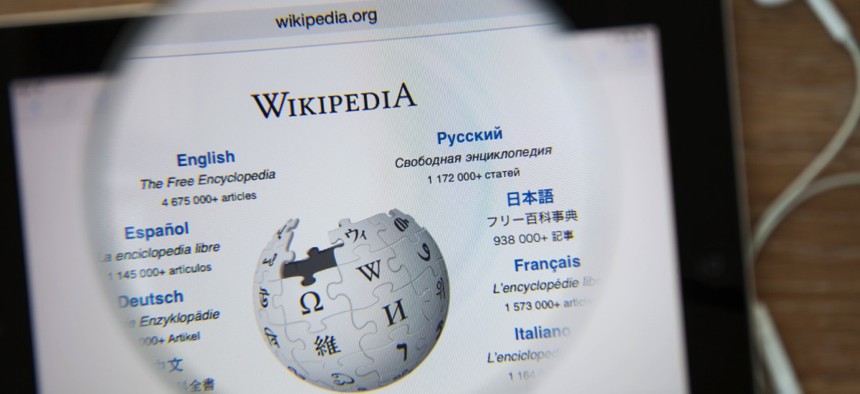Local Governments Could Play a Big Role in Helping to Shape Wikipedia

aradaphotography / Shutterstock.com
Wikipedia needs more information. And local governments just might have what the online encyclopedia needs.
WASHINGTON — It's difficult to imagine life without Wikipedia. From Aaliyah to Zzyzx, California, the online encyclopedia is the world's first stop for information about almost everything. Yet for all its ubiquity, and the site's "anyone can edit" rallying cry, very few of Wikipedia's millions of readers have even made a single edit.
For Wikipedia to maintain its current standards—let alone improve—new contributors and new types of participation are needed. In recent years, Wikipedia has built partnerships with museums, libraries and similar institutions, including at the federal level.
So far, local governments have not played a big role in this. But there is good reason to think they can.
From the local government perspective, the argument for participation is simple: constituents are already there, agencies have information to share, and Wikipedia's stated mission to provide "free access to the sum of all human knowledge" creates possibilities for collaboration. If your organization has something to offer—and is up to the challenge—here are some steps toward getting involved.
Find Someone to Lead the Initiative
Wikipedia has a steep learning curve, so it's necessary to identify someone to lead the inquiry. And that's exactly how it should begin: an inquiry. You may have an idea for creating a new Wikipedia article, but someone with expertise must evaluate whether it fits Wikipedia's content guidelines.
If you're lucky, you may already have someone within your organization who is a Wikipedia editor. This person may be the ideal point person, or could create a plan for others to follow. The good thing about Wikipedia is that overhead costs are low compared to more familiar social media engagements. On the other hand, it can require a considerable investment of time and brainpower.
Evaluate Opportunities for Collaboration
What kind of information might be useful to Wikipedia? Keep in mind that it is indeed an encyclopedia, and not a newsletter or bulletin board. Information requiring frequent updates may not be a good candidate for inclusion on Wikipedia. But historical data and reports concerning public initiatives may help expand Wikipedia's coverage of these topics.
How do you find areas to improve? You can start by searching Wikipedia, or any search engine with the word "wiki" appended. Articles related to local government topics can be found through the "Local government in the United States" category, and another one focused on information about U.S. cities.
Find Wikipedia Editors Interested in Your Subject Matter
Wikipedians have created numerous groups, called WikiProjects, focused on specific topic areas. Some are very active, while some are rarely visited, but it's worth checking to see if one relates to your efforts. All 50 states and major U.S. cities have their own WikiProjects, and many related topics are supported by the umbrella group WikiProject United States. Wikipedia editors are often busy with their own projects, so it may take some time to find someone to help. Patience and persistence are equally necessary.
Organize In-Person Wikipedia Collaborations
Wikipedians have developed a number of initiatives for getting outsiders involved with their encyclopedia-building project, and you should explore these. One is the "edit-a-thon," where Wikipedians come together in real life to work on a project, often in partnership with a local civic institution. It's easiest to organize these in dense urban areas, such as New York and Washington, D.C., but you could make it happen with just a few local Wikipedians.
Upload Photos and Other Media Under a Free License
If your agency or organization has an archive of photos, video, audio, or other documents, these could be useful as well. The key challenge here is licensing. Works of the federal government are almost always in the public domain, but for subnational entities, the law differs from state to state. If you can authorize the release of works under your agency's ownership via public domain or a specific Creative Commons license, then it might have a place on Wikipedia or Wikimedia Commons, a sister project that collects photos and other media.
Learn About the Next Big Thing: WikiData
Speaking of related projects, consider WikiData, a free knowledge database. While Wikipedia looks specifically for information to improve encyclopedia articles, WikiData is about "structured data" that can be sorted and tagged, connected with other databases, and used by researchers around the world. It tends to require even more technical expertise than Wikipedia, and is much earlier in its development. But it also may grow into something equally powerful, even if not as visible in search results.
Building an encyclopedia is a complex task, and Wikipedia's distributed volunteer community can be difficult for a traditional organization to understand. But Wikipedia is far more than the first place you go to settle a barroom bet. It's also the last word in the evolving written record of human society. Wikipedia is already well on its way to organizing the world's information—and doing so at the local level could be its next frontier.
William Beutler is the president of Beutler Ink, a digital agency specializing in Wikipedia engagement and social media content development.
(Photo by aradaphotography / Shutterstock.com)





